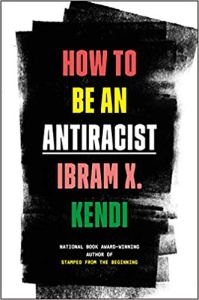
Dr. Ibram X. Kendi’s first book Stamped From The Beginning won the National Book Award for Nonfiction in 2016. It was, as the subtitle suggests, a “definitive history of racist ideas in America.” Kendi’s debut was an eye-opener for me when I read it, but the historical tome left me thirsty for guidance.
What should or even can be done to change the history of racism in America?
It was in response to this common reaction that Kendi first founded the Antiracist Research and Policy Center and then decided to publish a follow up how-to book for understanding racist ideas and taking deliberate action to work against them. His new book How To Be An Antiracist, a work I highly recommend no matter your background and/or political leanings, is an anecdote to that feeling of helplessness in the face of America’s historical and contemporary race problem. I cannot recall a book I marked up as much as this. I feel sorry for whoever reads my copy and has to squint through all the graffiti scrawled on the pages as I wrestled with Kendi’s ideas.

There are two extraordinary gifts Kendi has (among many others) that make How To Be An Antiracist essential 2019 reading. The first is Kendi’s ability to define terms, so everyone is on the same page before he gets deeper into his well researched manifesto. Each chapter begins with new terms and definitions. His definitions for racist and antiracist are deceptively simple- easy to remember and comprehend but challenging, even revolutionary when applied to policy and civic action.
Racist: One who is supporting a racist policy through their actions or inaction or expressing a racist idea.
Antiracist: One who is supporting an antiracist policy through their actions or expressing an antiracist idea.
Kendi thinks “racist” should be a descriptive word, not a pejorative. Otherwise in our mythological post-racial society the first instinct will always be denial, instead of the necessary investigation into our thoughts, words, and actions. Kendi wants our understanding of who is racist and what constitutes a racist idea to evolve into something more fluid and for lack of a better term…common.
The good news is that racist and antiracist are not fixed identities. We can be a racist one minute and an antiracist the next. What we say about race, what we do about race, in each moment, determines what – not who – we are.
The second thing Kendi does in How To Be An Antiracist is he removes the discussion from the purely theoretical and historical and makes it deeply personal, which in turn transforms this book of theory into something very moving to connect with. For many readers, especially white readers like myself, the idea of diving deep into the topic of race can make us nervous. Discussions of race often leave people emotionally hurt or veer into predictably divisive political arguments. By recounting his own racist ideas and experiences with racism, Kendi’s book frequently reads like a memoir, which has a powerful unifying effect. I can guarantee anyone who reads this book will be challenged by something in it, but any point in How To Be An Antiracist when a white reader may feel Kendi is pointing the finger at them, that finger is pointing equally and squarely back at himself.
I used to be a racist most of the time. I am changing. I am no longer identifying with racists by claiming to be “not racist.” … And I’ve come to see that the movement from racist to antiracist is always ongoing – it requires understanding and snubbing racism based on biology, ethnicity, body, culture, behavior, color, and space. And beyond that, it means standing ready to fight at racism’s intersections with other bigotries.
Racism is certainly not a cheerful reading topic. It offers no escapism or happy endings. Yet for as traumatic and bleak as America’s history of racism can read, there is surprisingly a lot of hope in How To Be An Antiracist. Kendi is almost supernaturally optimistic. He is not blind to the hard road ahead and makes it clear the work never ends. It is a hope that doesn’t come easy, even challenging the very idea of progress. But Kendi does believe change is possible and places his faith in the possibility of that change. He offers us in this gift of a book some helpful ways to develop our understanding of race and to orient our minds to the road ahead.
Discover more from Cook Memorial Public Library District
Subscribe to get the latest posts sent to your email.
Categories: Books and More
Tags: Books and More
